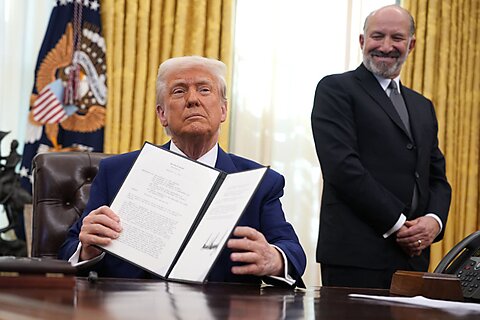President Trump officially put his foot down on debanking, issuing an executive order addressing accounts that were allegedly closed for religious or political reasons. To its credit, the administration largely prioritized investigations over interventions. That’s a strategy that Tennessee policymakers could have benefited from when they decided to use a questionable story to advance new restrictions on banks.
For anyone unfamiliar, “debanking” is a term for when a bank suddenly shuts down your account. It can be a jarring experience. Complex laws surrounding financial oversight might mean the bank gives you little or no explanation.
Conservative political commentator Michael Knowles recently documented this experience on social media. He received a vague message that there was a problem with his account, and customer support had him going in circles. Facing frustration, Knowles wrote, “I can only conclude that they’ve now decided that certain conservative opinions amount to ‘illegal’ activity.”
Yet, one day later, it turned out to be nothing of the sort. Knowles shared that the real reason was “a government administrative error rather than intentional de-banking.”
Still, that brief controversy mirrors what happened in Tennessee—a controversy that likely helped shape the Trump administration’s executive order. It was only last year that the Tennessee state government enacted a new law that effectively put the government in the boardroom of banks. Citing claims that banks were discriminating against Christians and conservatives, Tennessee policymakers made it illegal to deny services based on factors that cannot be quantified.
Both representatives and witnesses voiced concerns about this idea when the bill was being debated. At different points of the debate, Representative Bob Freeman (D‑TN) and First Bank President Chris Holmes pointed out that one problem with this prohibition is that not everything can be captured on paper when assessing risk. For example, Holmes noted how character loans are often praised for giving opportunities to people who may not check all the boxes. However, the flip side is that there are also people who check all the boxes but are awful to work with.
Running a business means being able to make those judgment calls on the spot.
Yet, what makes matters worse is that the case policymakers used to push the law forward seems to be just as misleading as Knowles’s initial experience. The only difference was that Knowles corrected the record.
What started everything in Tennessee was the case of Indigenous Advance Ministries. The Memphis-based nonprofit works to advance Christianity in Uganda, but its accounts were closed in the spring of 2023.
In response, the Alliance Defending Freedom (ADF) wrote, “No American should have to worry that a financial institution will deny them service based on their religious beliefs, but Bank of America appears to have done just that with Indigenous Advance.” In fact, the ADF echoed a similar sentiment when Knowles’s story first broke.
As with Knowles’s experience, however, it seems there was more to the story. Although it has since been removed, Indigenous Advance Ministries used to also feature something called IACC on its website, which stands for “Indigenous Advance Customer Center.” It seems the ministry was also running a debt collection agency in Uganda, offering services such as helping to “clean books” and pursue “the recovery of overdue invoices.”
In the account closure notice sent by Bank of America, the bank said, “We have determined you’re operating in a business type we have chosen not to service at Bank of America.” After controversy erupted, Bank of America confirmed that the debt collection business was the problem. And it’s likely for this reason that the Tennessee attorney general has yet to comment on the religious discrimination complaint it received two years ago.
Yet it’s been no secret that evidence was lacking. In an interview with the Chattanooga Times Free Press, the ADF acknowledged that it had no evidence that religious discrimination had taken place in the Tennessee financial system. Rather, it was the suspicion that discrimination took place that grabbed their attention.
Other groups said much the same. “We can’t really ascribe a motive to this,” said the National Committee for Religious Freedom. “We don’t know. But if [it] is religion, that should be frowned upon.”
Even the lawmaker who sponsored the bill had trouble making the case for it.
Mistakenly calling the ministry “Indigenous Adventure,” Representative Jason Zachary (R‑TN) said, “Indigenous Adventure [sic] in Memphis [had] their services … cancelled after 8 years with Bank of America … Bank of America told the Daily Mail they were canceled because they had a [debt] collection service in Uganda. Indigenous Adventure [sic] does not have a collection entity in Uganda. … So this is just one example in Tennessee.”
Almost every part of this statement appears to be wrong. Indigenous Advance Ministries featured the Indigenous Advance Customer Center on its website the same day Representative Zachary denied the claims. It is also a matter of public record that Indigenous Advance Ministries and Indigenous Advance Customer Center are owned by the same person.
The legislation may have been well intentioned, but Tennessee policymakers should repeal this ill‑considered mandate. And as other states move forward on similar legislation, they would be wise to avoid Tennessee’s mistakes. Good lawmaking should be built on clear and robust evidence. That’s even more true when changing the law means restricting the freedoms of other Americans.
As the Trump administration and other policymakers look forward, they should prioritize repealing the confidentiality requirements that prevent financial institutions from telling customers why their accounts were closed. Doing so would add transparency and help better identify where additional reforms are needed.















